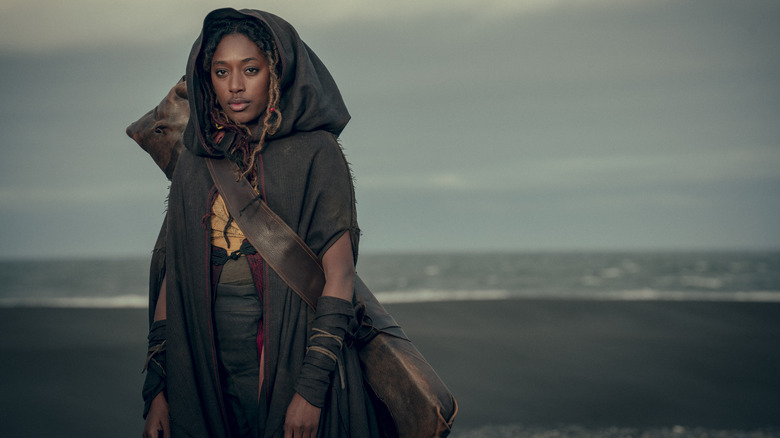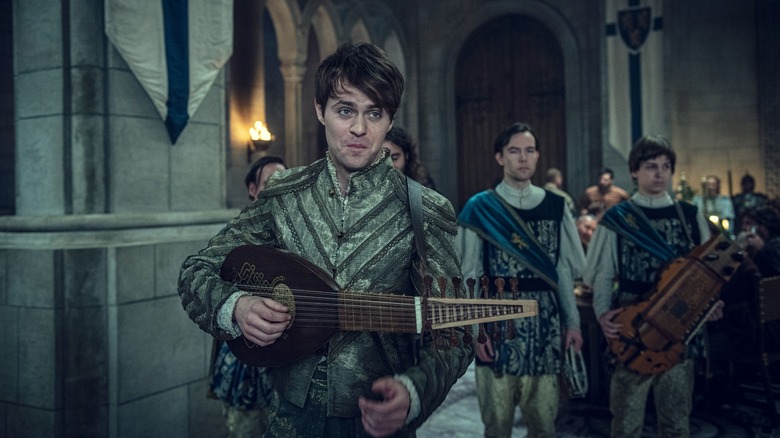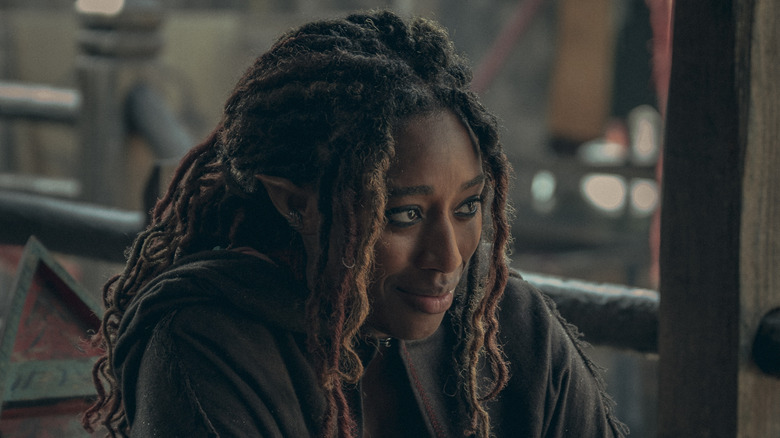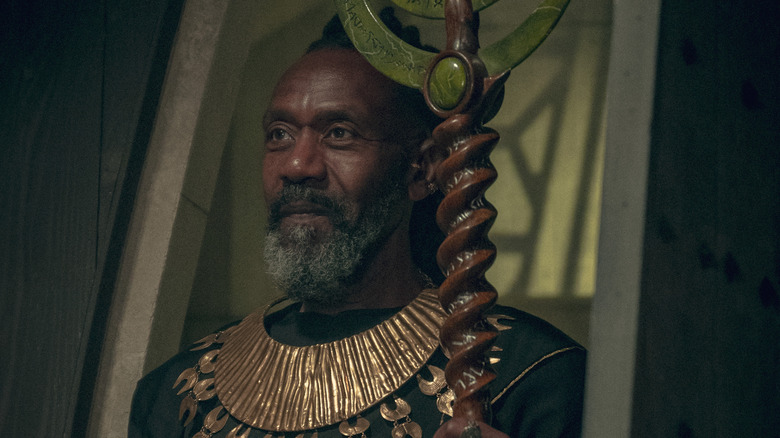A Love Of Folk Tradition Helped Bring The Witcher: Blood Origin To Life [Exclusive]
"The Witcher" has its fair share of songs and storytelling, but these arts are at the center of the upcoming prequel mini-series "The Witcher: Blood Origin." The show, which premieres on Netflix on December 25, 2022, follows seven warriors who team up to try and stop the universe-changing cataclysm called the Conjunction of the Spheres, but one of its warriors is also a bard. Bards, like Jaskier (Joey Batey) in "The Witcher," are essentially the way for people to get news from other regions in medieval and medieval-inspired fantasy stories, because they take information from town to town as they travel and play their music for coin. Jaskier chooses to follow Geralt (Henry Cavill) around in part because he wants to be able to write more songs and stories about the Butcher of Blavikin. Every bard needs a hero to write about, but in the case of the Lark in "Blood Origin," they are one and the same.
Éile (Sophia Brown) is a bard who left her warrior clan to tell stories instead of killing people for a living, and she ends up becoming pretty well-known pretty quickly for her haunting protest songs. People call her the Lark, after the songbird, and she helps spread both information and, more importantly, ideas. To learn about the musical storytelling aspect of things, I asked Batey and co-star Lenny Henry via Zoom about how oral tradition shaped the series. They both felt that stories are sometimes at their most powerful when shared aloud, and they have a way of changing history.
All stories have their roots in folk tradition
Jaskier shows up in "The Witcher: Blood Origin" to learn the story of the Lark and her six companions from a mysterious source, because it will be his job to carry the story on for his own time and world. Batey explained the role that Lark and Jaskier's real-life counterparts played in our own history:
"It goes back to what ostensibly was folk tradition and oral history. A huge amount of human history in our world was not recorded. People were illiterate, and the only way that certain stories would be able to travel and continue was through musicianship and through oral tradition."
Before Twitter, telephones, or even the printing press, music and stories told by memory were the main way that information was passed around. In order for revolutionaries to organize, they needed news from other towns. In order for people to rise up, they needed to know that it was possible to succeed. While Jaskier doesn't inspire quite that kind of reaction in either series, the Lark is something else altogether.
Stories passed on through song
Batey went on to explain a moment in the show where some characters who heard the Lark's performance a year before remembered all of the words and sang them back to her. It's a great scene that highlights the power of storytelling through song and hints at the impact of the Lark's words in particular. Batey appreciated its relevance to real medieval history, but Lenny Henry likened it to something a bit more contemporary:
"And you think about it, Chuck D from Public Enemy said that 'Hip-hop is like CNN for Black people.' And so in this world, songs and stories are their way of hearing the news. And it could be a metaphor, it can be a simile, but somebody singing a song isn't just singing a song. They're saying, 'This happened three weeks ago and you need to listen to this.'"
There's a lot going on in the music of "The Witcher: Blood Origin," but that shouldn't be too much of a surprise given that the showrunner, Declan de Barra, is a musician himself. It's clear that there's a lot of love and respect for the power of song coming from just about everyone behind the series, from the stars to the showrunner. The events of "Blood Origin" will lead up to the Conjunction of the Spheres and will introduce a kind of early proto-Witcher, so they're definitely worthy of being turned into songs and shared across centuries and worlds.
'Bad guys don't want ideas taking hold'
Henry's character isn't exactly a fan of this musical uprising, however. He plays Chief Sage Balor, a powerful sorcerer who sees the Lark as a threat:
"When the Lark sings, people are inspired or moved because she's telling them about their lives, which is why when Balor says, 'Well, that's a story that can take root with the common folk. Crush that story.' It's almost like he's saying burn all the books. Stories are powerful. There are means of communicating ideas and bad guys don't want ideas taking hold."
The Lark's songs could potentially lead to a revolution, which scares anyone in power. There's a reason that totalitarian governments often ban music and art that's not approved by the state — it's the fastest, oldest, and most powerful way to spread an idea. Folk singer Woody Guthrie wrote "This machine kills fascists" on his guitar way back in 1943, but it's still a fact today. Whether the "machine" is a lyre, a lute, a guitar, a ukulele, or just someone's singing voice, it has the power to take down even the most powerful titans. Musicians worldwide have used their skills to demand change, and whether that music is as intense as Rage Against the Machine or as melodic as Yusuf Stevens, it still has the ability to change the world.
Check out how the Lark's songs change everything when "The Witcher: Blood Origin" hits Netflix on December 25, 2022.



